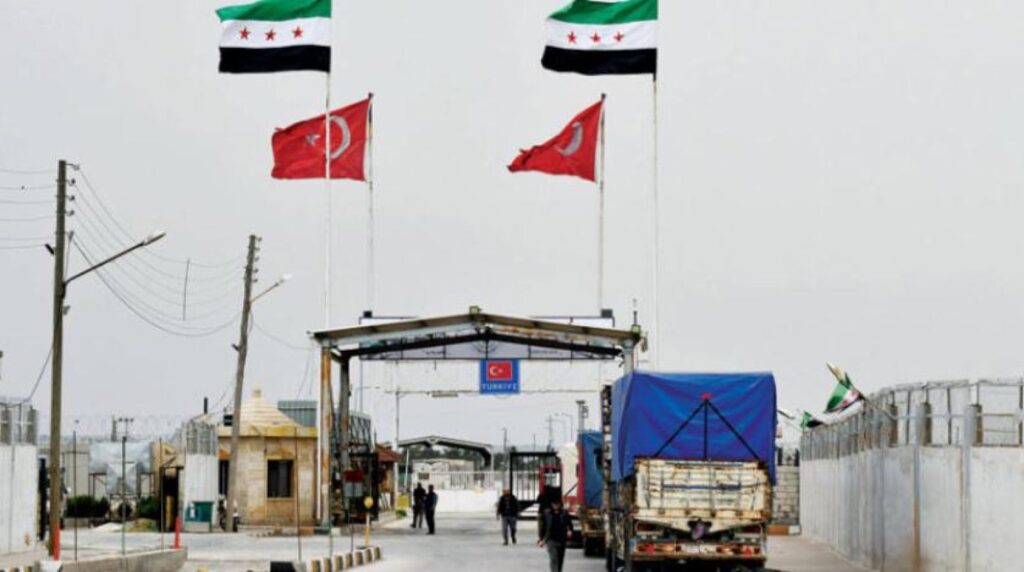Efforts to rebuild economic ties between Turkey and Syria have intensified following the Syrian government’s recent overhaul of its tariff system, which has sparked protests and strained trade at the border. Both nations are now exploring a potential free trade agreement to address the challenges and foster closer cooperation in the wake of Syria’s post-war reconstruction.
Syria’s New Tariff System: Benefits and Challenges
On January 11, Syria’s General Authority for Land and Maritime Transport introduced a standardized customs tariff system applied across all land, sea, and air border crossings. While the system reduced tariffs on some goods by 50–60%, others saw drastic increases of up to 500%, particularly on goods imported from Turkey via the northern Bab al-Hawa crossing.
Key examples of the increases include:
- Gasoline: Duty rose from $30 to $210 per metric ton.
- Flour: Tariffs increased tenfold, from $2 to $20 per ton.
- Cement: Tax on exports jumped to $27 per ton, nearly half its export price of $50 per ton.
The policy, intended to stabilize Syria’s treasury and protect local industries, has raised concerns among traders and residents already grappling with poverty. Protests erupted in Sarmada, Idlib province’s commercial hub, where shopkeepers closed businesses to express dissatisfaction with the tariff hikes. Many fear rising costs on essential goods like gasoline, flour, and iron will worsen inflation and economic hardship.
Impact on Trade and Border Activity
The tariff increases have led to logistical challenges at border crossings. According to reports, 6-kilometer-long queues of trucks have formed at the Turkey-Syria border, as companies hesitate to proceed with trade under the higher costs. Turkish exporters warn that the increases could severely impact purchasing power in Syria and disrupt essential goods supply chains.
While some stakeholders understand Syria’s aim to revive its economy, others, including Turkish business leaders like Nihat Özdemir of Limak Holding, have expressed surprise at the steepness of the increases. Özdemir stated, “Such a high level of tax being applied to Turkey is hard to understand, especially given the improving relations between the two nations.”
Turkey and Syria’s Ongoing Discussions
In response to the situation, Turkey’s Trade Ministry confirmed it has been in consultations with Syrian authorities to address the tariff hikes. A face-to-face meeting is planned for the coming week as part of efforts to negotiate a resolution. Both governments have expressed interest in a “new and more comprehensive free trade agreement”, signaling a willingness to strengthen bilateral economic ties.
This potential agreement could be pivotal in restoring trade relations, which have fluctuated significantly since the onset of the Syrian civil war in 2011. Pre-war trade volumes stood at $2.3 billion in 2010 but dropped to $565 million by 2012. While trade has recovered slightly, with Turkey exporting $1.95 billion worth of goods to Syria in 2024, it remains far below its previous levels.
Broader Implications for Reconstruction and Regional Stability
Turkey has pledged to support Syria’s reconstruction following the recent fall of Bashar al-Assad’s regime. Turkish companies are expected to play a significant role in rebuilding efforts, providing essential goods and infrastructure. However, the tariff policy poses challenges to these plans by increasing costs and complicating trade flows.
From Syria’s perspective, the policy reflects an attempt to stabilize its economy after years of war. However, balancing fiscal goals with the need to maintain affordable imports and economic cooperation remains a critical challenge.
What Lies Ahead?
As discussions progress, the outcome of Turkey and Syria’s negotiations could have significant regional implications. A free trade agreement has the potential to improve economic conditions, stabilize prices, and support reconstruction. Yet, both nations must address the immediate impacts of the tariff hikes on traders and residents, ensuring that economic recovery benefits all stakeholders.
For further details, clarification, contributions or any concerns regarding this article, please feel free to reach out to us at editorial@tax.news. We value your feedback and are committed to providing accurate and timely information. Please note that all inquiries will be handled in accordance with our privacy policy.

1 Comment
Pingback: اتفاقية التجارة الحرة بين تركيا وسوريا: فرص واعدة وتحديات قائمة